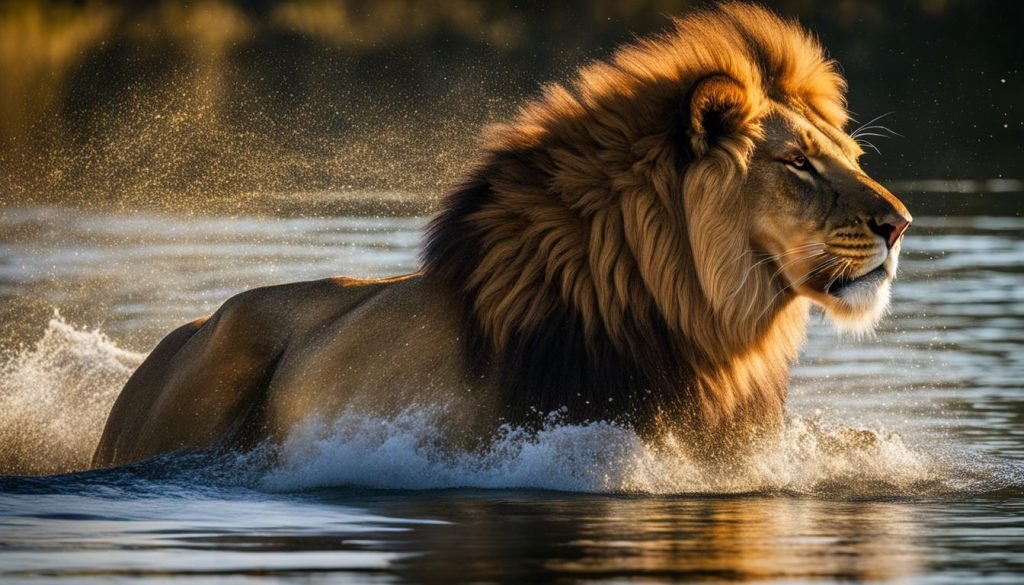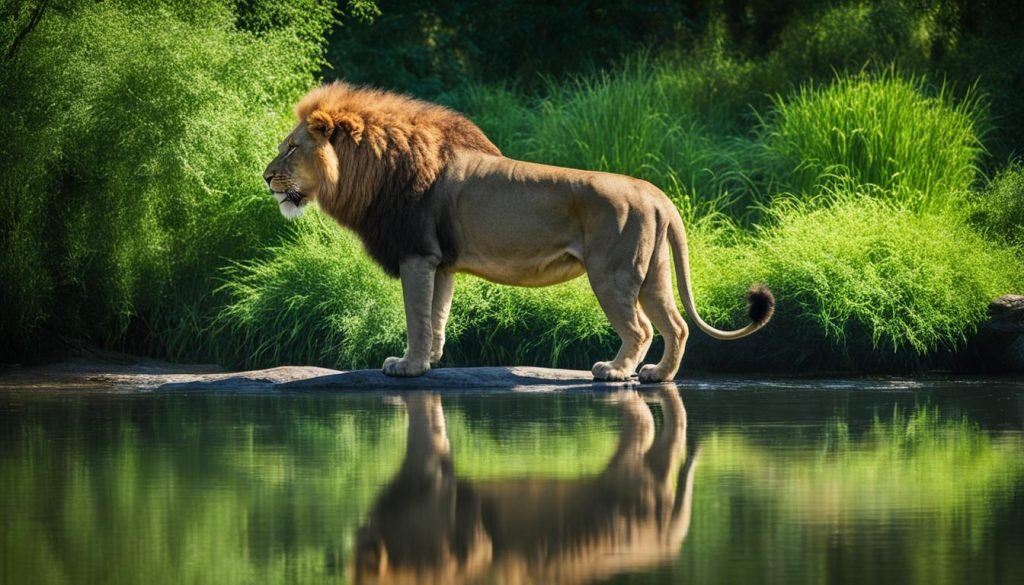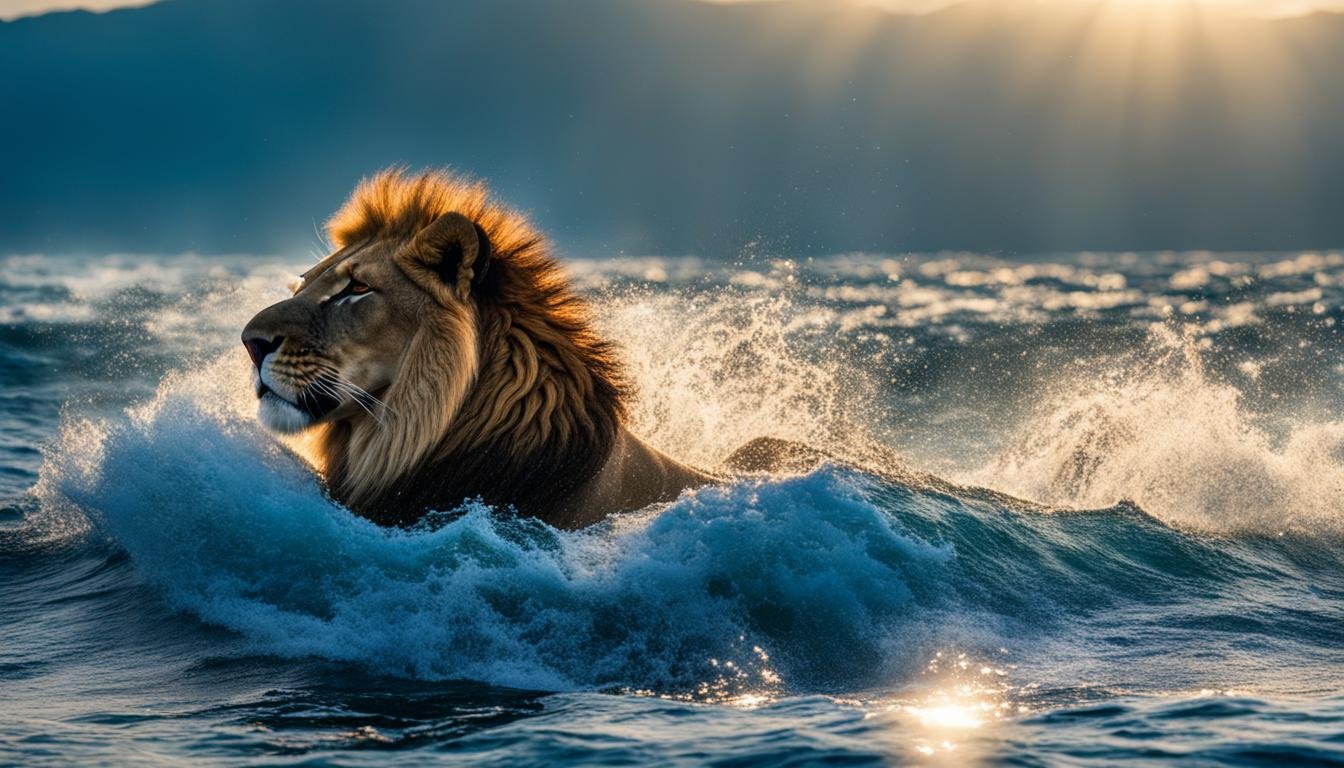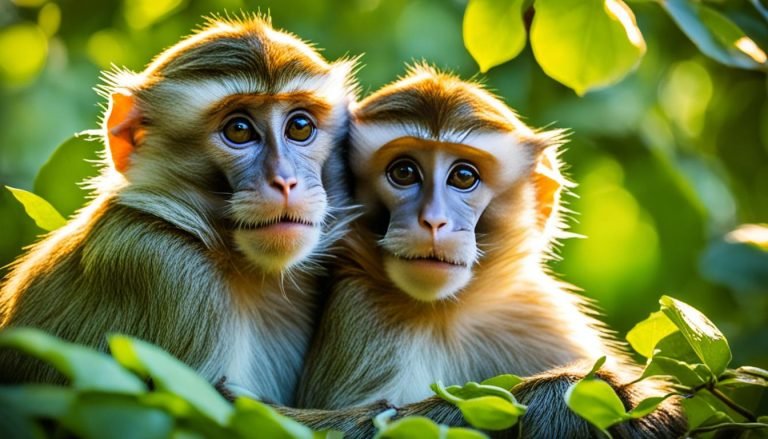Can Lions Swim? Lion’s Swimming Ability Examined
When we think of lions, we usually picture them prowling the grasslands of Africa, hunting prey, or basking in the sun. But can lions swim? In this article, we will explore the swimming abilities of lions, discussing their potential for survival in water and their behavior in aquatic environments.
Lions are not generally known for their swimming skills, but they do possess certain abilities that allow them to navigate water when necessary. From their hunting strategies to their social behavior, water plays a crucial role in the lives of these majestic animals. Let’s dive in and explore the mysteries of lion swimming!
Key Takeaways:
- Lions are capable swimmers, but they are not built to swim long distances.
- Water plays an important role in the social behavior of lions, including bathing, playing, and drinking.
- Lions have unique aquatic hunting strategies that contribute to their survival in water.
- Understanding lion swimming behavior is crucial for their conservation and protection in the wild.
- While lions may not excel in swimming, their adaptations to aquatic environments contribute to their overall fitness and survival as apex predators.
Can Lions Swim? Lion Aquatic Skills

Lions are often associated with the African savannah, but this doesn’t mean they can’t swim. Lions have adapted to their environment and have certain skills that enable them to move through the water when necessary. Although they are not as comfortable swimming as other big cats such as tigers, lions are still capable of swimming great distances and have been observed swimming across rivers up to 13 meters.
While their swimming is generally not as graceful as other big cats, lions are surprisingly adept at navigating through water. They use their strong legs and paws to propel themselves, while their thick fur helps them stay afloat. In addition, lions have been known to use different swimming styles depending on the circumstances, which include a doggy paddle and the breaststroke.
Even though they may not be the most efficient swimmers, these adaptations are crucial for their survival in the wild. Lions have to cross rivers to catch prey or move between territories, and their swimming abilities are essential for survival.
So to answer the question – do lions have swimming skills? The answer is yes. Lions may not be the best swimmers, but they have developed certain techniques to cope with aquatic environments when needed. It’s another fascinating example of how animals adapt to their surroundings out of necessity.
“Lions have adapted to their environment and have certain skills that enable them to move through the water when necessary.”
Lion Adaptation to Water

Despite being primarily terrestrial animals, lions have made certain adaptations to survive in water. These adaptations allow them to navigate aquatic environments with more ease and efficiency.
One key adaptation is their ability to swim with their heads held high above the water, which enables them to maintain a clear view of their surroundings. Lions are also able to hold their breath for relatively long periods, allowing them to remain submerged while hunting or crossing water bodies.
Lions have also adapted their diets to incorporate aquatic prey. In regions with abundant water sources, lions may hunt prey such as fish, crocodiles, and hippos. These adaptations have expanded the range of environments where lions can successfully thrive.
“Lions have developed unique adaptations to overcome challenges associated with navigating aquatic environments.”
Another adaptation that helps lions survive in water is their powerful muscles, which allow them to move quickly through water. Their muscles are essential for swimming and hunting prey in water. Furthermore, lions have a fur coat that can repel excess water and prevent them from getting completely soaked. This adaptation helps them regulate their body temperature and avoid hypothermia, especially in cold water regions.
Overall, the ability of lions to adapt to different environments, including aquatic environments, has enabled them to survive in various habitats. Although they may not be natural swimmers, their adaptations allow them to navigate water bodies with ease.
Lion Quiz
How well do you know Lions? Test your knowledge below!

Lion Swimming Behavior

While not known for their aquatic prowess, lions exhibit interesting behaviors in the water. Their swimming habits have been observed to differ from other big cats, as they tend to use water for various purposes beyond just hydration.
One notable behavior is their willingness to swim across bodies of water. Lions have been observed crossing rivers and lakes, often to reach prey or establish a new territory. They move quickly and confidently through the water, displaying their adaptability to different environments.
Additionally, lions have been witnessed using water as a form of play. They are known to frolic and splash in the water, enjoying their cool relief from the hot sun. This activity helps to strengthen social bonds between individuals and promotes a sense of community within the pride.
“Lions have been observed crossing rivers and lakes, often to reach prey or establish a new territory.”
It is also noteworthy that lions often bathe in water. This helps to keep their coats clean and cool, wards off parasites and can improve their scent-tracking abilities. Overall, lion swimming behavior demonstrates their adaptability in using water for multiple purposes beyond just survival.
Lion Habitat and Water Sources

Lions are primarily found in regions where water is a vital resource for their survival. Lion behavior in water has been observed to revolve around these water sources, and these majestic creatures have developed fascinating ways to interact with aquatic environments in the wild.
As apex predators, lions do not often face competition for water sources. Their presence near these sources may lead to conflicts with other predators or herbivores, but they are well-equipped to handle these situations. Lions have been seen drinking from and even bathing in water sources like rivers, streams, and lakes.
When it comes to swimming, lions are not known for their prowess in the water. However, they do possess certain swimming abilities that allow them to navigate water when necessary. Lions may cross the water to find prey or to move to another part of their territory.
Lions and Crocodiles
In some areas, lions have to share their water sources with apex predators like crocodiles. In such areas, lions have been seen as being more cautious around water. They tend to avoid these water sources during the cooler parts of the day when crocodiles are more active.
| Lions | Crocodiles |
|---|---|
| Primarily terrestrial animals | Semi-aquatic animals |
| Can swim, but not for long periods | Excellent swimmers and can hold their breath for long durations |
| Predators | Apex predators |
Lions and Hippos
Lions may also encounter other semi-aquatic animals like hippos. Unlike crocodiles, hippos are herbivores and tend to be much less aggressive towards lions. However, lion attacks on hippos have been observed when other prey is scarce.
In summary, lions have a complex relationship with aquatic environments. While they may not be natural swimmers, they have developed certain behaviors and adaptations that enable them to survive around water sources. Their interactions with other predators and herbivores add an extra layer of complexity to their relationship with water.
Lion Hunting Strategies in Water
While lions are primarily terrestrial animals, they are also capable of hunting in and around water. Their swimming abilities allow them to navigate bodies of water, and they have been observed using unique hunting strategies in aquatic environments.
Swimming Ability in Hunting
Lions have a significant advantage when hunting prey that is in or near the water. They can swim to reach their target and execute the attack from a submerged position, increasing stealth and surprise. Their swimming ability also allows them to launch an attack from a safe distance, which is useful when hunting prey that is dangerous or difficult to take down.
Unique Behaviors in Aquatic Environments
When hunting in or around water, lions exhibit unique behaviors that are not commonly seen in their terrestrial hunting. For example, they have been known to use teamwork to corner prey, with some of the lions blocking a potential escape route while others attack from the water. Lions have also developed a hunting technique that involves chasing prey into the water and drowning them, similar to how they hunt in the savannah.
“Observing lions in their aquatic environment is a rare and exciting experience. Their swimming ability and hunting strategies reveal a new side to these magnificent predators.”
Effectiveness as Aquatic Predators
While lions are not necessarily specialized aquatic predators, their ability to swim and adapt to water environments makes them effective hunters in these habitats. They can hunt various aquatic prey, including fish and larger animals like hippos and crocodiles.
- Lions can launch attacks from underwater positions, allowing them to take down prey with greater stealth and surprise.
- They exhibit teamwork and strategic hunting techniques that are unique to aquatic environments.
- Their swimming ability and adaptability to water make them effective hunters of aquatic prey.
Overall, lions’ swimming ability and unique hunting strategies make them formidable predators in and around water. While they may not be primary aquatic animals, they have adapted to thrive in these environments and can successfully hunt aquatic prey to sustain themselves.
Lion vs. Other Aquatic Predators

Lions are not the only predators that share their habitats with aquatic environments. Other carnivorous animals, including crocodiles, hippos, and tigers, also inhabit areas where they come into contact with water. However, unlike these other predators, lions are not adapted to living primarily in the water.
Despite this disadvantage, lions possess impressive swimming skills that are comparable to those of other terrestrial animals in their environment. For example, they can swim distances up to 8 km and cross rivers up to several hundred meters wide. Lions also use their natural ability to swim when hunting animals that take refuge in water.
However, when compared to specialist aquatic predators such as crocodiles or hippos, lion swimming ability falls short. These animals rely on water as their primary habitat and have adapted accordingly. Crocodiles are known to be skilled swimmers with strong, streamlined bodies built for aquatic movement. Hippopotamuses have webbed feet and large lungs to help them stay underwater for extended periods.
It is important to understand these differences when considering the potential for lions to survive in water. While they are capable swimmers, they face greater limitations and challenges than their aquatic counterparts.
The Role of Water in Lion Social Behavior
Water is not only critical to the survival of lions but also plays a crucial role in their social behavior. Bathing, drinking, and playing in water sources are all common activities for lions that offer a chance for social interaction.
Lions are social animals that form groups, or prides, for protection and better chances of hunting. Water sources, such as rivers and lakes, serve as meeting points for members of the pride. These water sources create vital territories for the pride to lay claim, with each pride having its specific territory that includes reliable water sources for survival.
Playing in water is also an opportunity for bonding and socializing among pride members. Young cubs can often be seen playing in shallow water, with adults joining in on the fun, reinforcing social bonds. Furthermore, for adults, swimming can be a demonstration of dominance as water movements can disrupt the hierarchy and demonstrate physical strength.
Water Activities Observed in Lions
| Activity | Description |
|---|---|
| Bathing | Lions frequently bathe to cool down, groom, and rid themselves of parasites and debris that could lead to infections. |
| Drinking | Lions require lots of water to survive and can consume up to 10% of their body weight in water per day. |
| Playing | Water is an important place for lion cubs to bond and learn social skills while staying cool. |
Thus, water permeates a significant part of the social behavior of lions. The availability of water in their environment plays a critical role in their survival. Additionally, the interactions that take place around water sources offer a chance to nurture social bonds for the pride to remain stable and grow with new pride members.
Challenges Faced by Lions in Water
Despite possessing limited swimming skills, lions often find themselves in or near water sources. This exposes them to various challenges and dangers that can compromise their survival.
- Powerful currents: Lions may struggle to maintain their grip in fast-moving water bodies, limiting their ability to move around.
- Deep waters: As primarily terrestrial animals, lions are not well-equipped to handle deep waters, which can lead to drowning.
- Prey competition: Water sources attract a range of prey species, leading to competition between lions and other predatory animals.
- Risk of predation: Aquatic environments expose lions to attacks from other predators, such as crocodiles and hippos.
To survive in water, lions have to rely on their agility and quick reflexes to avoid danger and navigate their surroundings. Awareness of potential challenges can aid in protecting lion populations and ensuring their continued survival in the wild.
Conservation Implications
The swimming ability of lions is not only fascinating, but it also has vital conservation implications. Knowledge of their swimming behavior can help maintain the populations of wild lions.
We know that water sources are a crucial part of the lives of these majestic creatures, and human activity can cause pollution, depletion, or destruction of them. Therefore, awareness of the lion’s swimming abilities and their relationship with water can aid in the sustainable management of water resources. Adequate availability of clean water can ensure the well-being of both lions and other wildlife sharing their habitat.
Furthermore, the conservation of lion populations requires measures that take into account their swimming abilities. Maintaining water sources and managing them to ensure that lions have adequate swimming areas could be critical to securing their future.
Overall, understanding the swimming abilities of wild lions highlights the need to preserve their habitat and the ecosystems in which they live, all of which are paramount in their conservation.
Conclusion
So, can lions swim? While they may not be known for their aquatic abilities, lions do possess certain skills that enable them to navigate water when necessary. Their natural adaptation to water, unique swimming behaviors, and hunting strategies in aquatic environments all contribute to their ability to survive in the wild. It’s important to understand these aspects when considering the conservation of these magnificent creatures.
By studying lion swimming abilities and behavior, we can continue to learn more about these amazing animals and how to better protect them. With their habitats often bordering water sources, understanding their aquatic skills becomes even more critical. It’s essential to ensure the survival and well-being of lion populations for the greater health and balance of their ecosystems. In conclusion, while lions may not be prodigious swimmers, they are more than capable of surviving in the water when necessary, showcasing just another one of their many remarkable adaptations.
More About Lions
- Lion Defense Tactics: How Do Lions Protect Themselves?
- Do Lions Eat Humans?
- Cannibalism in Lions: Do Lions Eat Other Lions?
- Do Lions Hibernate During Winter?
- What Do Lions Do During the Night?
- How Do Lions Communicate With Each Other?
- Where Do Lions Sleep?
- How Big Can Lions Get?
- How Long Are Lions Pregnant? Gestation Period
- How Much Do Lions Weigh? Lion’s Weight Revealed
- How Fast Can Lions Run?
- How Do Lions Mate? – Lion Reproduction







